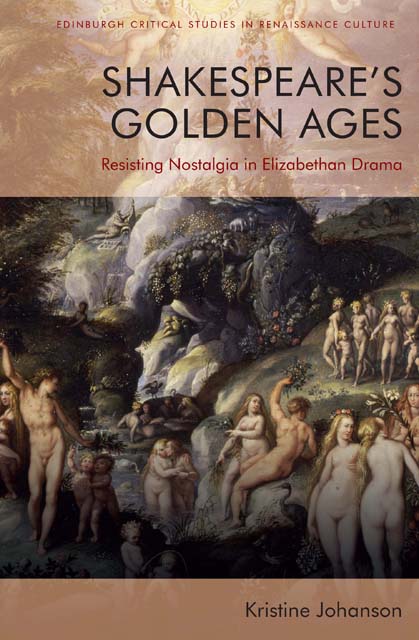Book contents
- Frontmatter
- Contents
- Dedication
- Series Editors’ Preface
- Prologue
- Note on Citation
- Introduction: Rethinking Nostalgia
- 1 Against Nostalgia: Looking Forward to the Future in the Queen’s Men’s Plays and Marlowe’s Tamburlaine
- 2 What Merry World in England? Nostalgic Paroemia and The Second Part of Henry VI
- 3 In the Mean Season: Richard II’s Absent Hospitality
- 4 The Lessons of Nostalgia in Julius Caesar and Sejanus
- Conclusion: Resisting Nostalgia
- Bibliography
- Index
Conclusion: Resisting Nostalgia
Published online by Cambridge University Press: 18 November 2022
- Frontmatter
- Contents
- Dedication
- Series Editors’ Preface
- Prologue
- Note on Citation
- Introduction: Rethinking Nostalgia
- 1 Against Nostalgia: Looking Forward to the Future in the Queen’s Men’s Plays and Marlowe’s Tamburlaine
- 2 What Merry World in England? Nostalgic Paroemia and The Second Part of Henry VI
- 3 In the Mean Season: Richard II’s Absent Hospitality
- 4 The Lessons of Nostalgia in Julius Caesar and Sejanus
- Conclusion: Resisting Nostalgia
- Bibliography
- Index
Summary
Starting from a critical position that questions how we understand nostalgia in early modernity, this book has argued that Shakespeare's Elizabethan histories stage nostalgia's power as a future-oriented, ambivalent, political rhetoric. By dramatising nostalgia as a rhetoric available to those in and out of power, Shakespeare marks nostalgia as a suspect practice as he reveals how accessible, and therefore how unstable, the language of the idealised past and its attendant promises of a better future are. Using the familiar idealising discourses of his time – of a merry world, of hospitality, of ancient Rome – Shakespeare emphasises nostalgia as rhetoric, rather than strictly a process of cultural memorialising. By situating nostalgia in that moral and political realm of rhetoric, I have not focused exclusively on what happens in the idealising process of nostalgia – what is remembered, what is forgotten, what is invented – but on how that idealisation is used. Shakespeare shows how quotidian such a process is; it happens in proverbs, in laments for long-waning social customs, in learned comparisons with ancient Rome. He then stages this discourse as consistently successful and reliably untrustworthy, thereby destabilising discourses familiar both on stage and off stage and insisting on the fictiveness of the idealised past. That there are multiple golden ages signifies that there never was one, but their image of perfection, he insists, is tantalising.
While contemporary attitudes to nostalgia reject its perceived futile sentimentality and impulse to reify the past, early modern English disapproval of nostalgia emerges from religious and political concerns. The suspicion of nostalgia staged by Shakespeare's dramaturgy expands and nuances a resistance to nostalgia evident in a range of sixteenth-century texts. Significantly, Shakespeare translates his contemporaries’ qualms about nostalgia into a broader reflection on why the longing for an ideal past possesses such persuasive power, as he binds dramatic nostalgic rhetoric to the hope for a better future. By insisting on nostalgia's availability and by presenting nostalgia as a political tool – a political weapon, even – Shakespeare illustrates once more his interest in drama's capacity to challenge his audience's habits of mind and to shape civic political thought.
His mistrust of the idealised past links Shakespeare to those dramatists who influenced him and who he in turn influenced: the Queen's Men's playwrights, Marlowe, and Jonson.
- Type
- Chapter
- Information
- Shakespeare’s Golden AgesResisting Nostalgia in Elizabethan Drama, pp. 165 - 171Publisher: Edinburgh University PressPrint publication year: 2022

